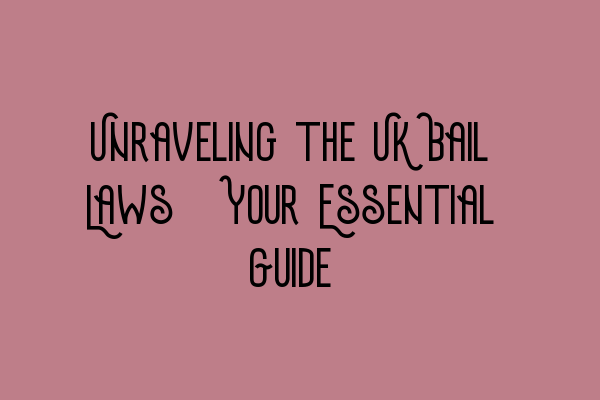Unraveling the UK Bail Laws: Your Essential Guide
Welcome to SQE Criminal Law & Practice Law UK! As experts in criminal law, it is our duty to provide you with comprehensive and up-to-date information. In this blog post, we will delve into the intricate world of UK Bail Laws, breaking it down into key points that you need to know. Whether you are an aspiring solicitor or someone seeking legal knowledge, we’ve got you covered!
Understanding Bail
Bail is a fundamental aspect of the criminal justice system that ensures the fair treatment of individuals who have been accused of committing a crime. It serves as the temporary release of an accused person prior to their trial or court appearance, with the condition that they will return for further legal proceedings.
When it comes to bail, there are various aspects that need to be considered. From the criteria for granting bail to the different types of bail, it can be quite overwhelming. Let’s break it down for you:
The Criteria for Granting Bail
Before granting bail, the court takes into account several factors to determine whether the accused should be released or detained. These criteria include:
- The seriousness of the offense
- The likelihood of the accused absconding or interfering with witnesses
- The defendant’s previous convictions
- The defendant’s ties to the community and employment status
- The defendant’s mental health and vulnerability
Based on these factors, the court makes an informed decision to grant bail, impose certain conditions, or deny bail altogether.
Types of Bail
There are various types of bail that can be granted, depending on the circumstances of the case:
- Police Bail: This is when the police release the accused person from custody, prior to their appearance in court. It is usually granted for less serious offenses, and it may be subject to certain conditions, such as reporting to the police station regularly.
- Court Bail: This is when the court grants bail during or after the accused person’s first appearance in court. The court may impose conditions to ensure the accused person’s compliance with legal proceedings.
- Conditional Bail: This is when the court imposes specific conditions on the accused person’s release, such as surrendering their passport, residing at a specific address, or refraining from contacting certain individuals.
- Unconditional Bail: This is when the court releases the accused person without any specific conditions, but they are still required to attend court for further proceedings.
Understanding the different types of bail is crucial for both legal professionals and individuals seeking legal advice.
Importance of Legal Representation
When navigating the complex world of bail laws, it is essential to have proper legal representation to ensure your rights are protected. Qualified solicitors who specialize in criminal law can guide you through the process, help make bail applications, and provide expert advice.
At SQE Criminal Law & Practice Law UK, we offer SQE 1 Preparation Courses and SQE 2 Preparation Courses to aspiring solicitors who want to excel in the field of criminal law. Additionally, we provide practice exams and mocks to help you prepare for the SQE 1 exams. Check out our SQE 1 Preparation Courses and SQE 2 Preparation Courses to kickstart your journey.
Stay Updated
Keep yourself informed about the latest updates and changes in the world of criminal law. The SRA SQE Exam Dates are crucial information for aspiring solicitors. Make sure you stay up to date with the exam schedule by checking out the SRA SQE Exam Dates.
That brings us to the end of our guide on UK Bail Laws. We hope that this information has been valuable and has unraveled the complexities of bail for you. For any further queries or legal assistance, don’t hesitate to reach out to SQE Criminal Law & Practice Law UK.
Check out our SQE 1 Practice Exam Questions and SQE 1 Practice Mocks FLK1 FLK2 for additional preparation materials.
